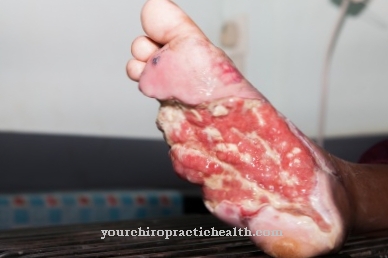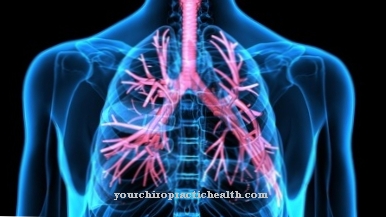PANDAS is a now recognized neuropsychiatric syndrome, which can be triggered by a previous infection with beta-hemolytic streptococci of group A in children and adolescents. The symptoms are similar to those of obsessive-compulsive disorder or Tourette's syndrome. Antibiotic treatment has already been successful in preventing the disease from becoming chronic.
What is PANDAS?

© RAJCREATIONZS - stock.adobe.com
PANDAS is the abbreviation for the English name of the syndrome Pediatric A.utoimmune Neuropsychiatric D.isorders A.ssociated with S.treptococcal Infections ". This name stands for a neuropsychiatric syndrome that can be triggered by infection with beta-hemolytic group A streptococci in childhood and adolescence.
The most important bacterial species in this group is Streptococcus pyogenes. Streptococcus pyogenes causes scarlet fever or purulent tonsillitis, among other things. It has been found that in a few cases the neuropsychiatric syndrome PANDAS breaks out suddenly following these infectious diseases.
If left untreated, this disease can become chronic. PANDAS syndrome shows symptoms similar to obsessive-compulsive disorder or tics (Tourette's syndrome). It is an autoimmune disorder that is attributed to a cross-reaction of the antibodies that attack the surface of the bacteria with special structures of the brain, the basal ganglia.
Beta-hemolytic streptococci of group A generally have the property of being able to trigger rheumatic fever and other rheumatic diseases after an infection. The mechanism of the development of these secondary diseases of the infection is similar in all diseases of the rheumatic circle.
The antibodies often attack the body's own structures, especially collagen IV. The resulting diseases include rheumatic heart inflammation, inflammation of the joints (arthritis), skin inflammation (erythema), muscle inflammation or chorea minor.
causes
As already mentioned, the cause of the occurrence of PANDAS is to be found in a cross-reaction of the antibody against the bacterial surface with the body's own structures in the brain. These are structures of the basal ganglia. The basal ganglia are responsible for coordinating movements.
If they are damaged, motor skills are impaired, which correspond to the clinical picture of chorea minor. In contrast to chorea minor, with PANDAS the psychiatric symptoms dominate. Imaging studies found that there were changes in parts of the brain, in the striatum.
PANDAS is an autoimmune disease in which the body's own immune system attacks the basal ganglia. As far as we know, this disease is caused by beta-hemolytic streptococci of group A. PANDAS, however, belongs to a group of syndromes that are summarized under PANS and show similar symptoms.
It is assumed that all diseases in this group are caused by basal ganglia antibodies, although other infections and non-infectious processes can also play a role in PANS. Only in the subgroup of PANS, from PANDA, is the specific trigger of the disease of the antibodies against beta-hemolytic streptococci of group A.
Symptoms, ailments & signs
PANDAS syndrome is characterized by motor disorders that can occur suddenly after infection such as scarlet fever, purulent tonsillitis or acute otitis media. The disease begins abruptly with behavioral and thought disorders or tics. Food intake is often denied.
Other symptoms are anxiety, aggression, irritability, depression, retardation in behavioral development in children and adolescents, concentration disorders, deterioration in school performance, deterioration in handwriting, sleep disorders, bedwetting, memory disorders and other psychiatric abnormalities.
A unique selling point of PANDAS is that the combination of all symptoms cannot be better explained by other diseases such as chorea minor, Tourette's syndrome or lupus erythematosus. In particular, symptoms must occur following an infection with group A beta-hemolytic streptococci.
Diagnosis & course of disease
PANDAS diagnostics are based on the type of symptoms associated with the offending infection. In a differential diagnosis, the symptoms of PANDAS can be compared with the symptoms of obsessive-compulsive disorder without an infectious background (OCD).
Symptoms such as frequent urination, separation fears, impulsiveness, hyperactivity, bad typeface and a deterioration in school performance come to the fore with PANDAS. These characteristics are closely related to the way the basal ganglia work. Finally, imaging procedures provide information about the damaged areas in the brain (striatum).
Complications
At PANDAS, those affected primarily suffer from various mental disorders. The symptoms can be different. In most cases, however, there are various motor disorders and inflammation in the ears. Those affected suffer from various behavioral and thought disorders and thus also from delayed development.
Therefore, if PANDAS is not treated at a young age, it can lead to considerable complications and difficulties in the adulthood of the patient. Those affected continue to suffer from bedwetting and concentration disorders. Sleep disorders and persistent aggression or irritability can also occur and thus lead to social complaints. In many cases, the parents of the children at PANDAS also suffer from severe psychological complaints and depression.
School performance can deteriorate due to illness. In many cases, the patients are also dependent on the help of their fellow human beings in everyday life. Treatment of PANDAS can be carried out with the help of medication. However, psychological treatments are also necessary to limit the symptoms completely. The life expectancy of the patient is in most cases not affected by the disease.
When should you go to the doctor?
If children or adolescents show motor disorders during their developmental process, there is cause for concern. The symptoms appear suddenly after a cured infectious disease and put a heavy burden on the child's health. A doctor should be consulted in the event of earache, noise in the ear, fever, general malaise or lack of interest. If behavioral problems, peculiarities of the personality or disturbances of the intellectual capacity are found, the observations should be discussed with a doctor.
If the mental performance level drops, if there is night wetting or if tics develop, the child needs medical help. Compulsive acts, an aggressive demeanor, easy excitability and inner restlessness are signs of impaired health. If the general condition worsens, if the child forgets the skills they have already acquired or if they appear very stressed, a doctor should be consulted. The worsening of the child's handwriting is characteristic of the disease.
If this is noticed, a doctor should be consulted immediately. Loss of appetite, withdrawal, or refusal to engage in playful activities are considered unusual. If this development continues, it is advisable to consult a doctor. An anxious demeanor, decreased self-confidence and sleep disorders should also be presented to a doctor. If the child forgets an already achieved independence, this should be understood as an alarming signal. A visit to the doctor is recommended as soon as possible.
Treatment & Therapy
PANDAS is a syndrome that is currently still in the research stage. Hence there are no strategies for causal treatment yet. At the moment, treatment is mainly symptomatic. Behavioral therapies are offered to treat behavioral structures.
At the same time, drug therapies with psychotropic drugs are also used. It is questionable, however, whether these therapies can prevent the disease from becoming chronic. Hopeful approaches for a curative therapy emerge in the context of studies where, with the help of antibiotic treatment, an extensive improvement and suppression of symptoms was achieved.
With these therapies it is assumed that the fight against the beta-hemolytic streptococci of group A also reduces the effect of antibodies against the body's own structures. As long as there are no irreversible changes in the brain, the disease can then heal completely.
You can find your medication here
➔ Medicines to calm down and strengthen nervesOutlook & forecast
The acronym "PANDAS" stands for "Pediatric Autoimmune Neuropsychiatric Disorders Associated with Streptococcal Infections". The prognosis for this is currently still poor. Neuropsychiatric symptoms often occur after a streptococcal infection. The complaints set in suddenly. If these are left untreated and the streptococcal infection is not recognized as a type A infection, chronic PANDAS courses will develop.
The experts assume that this type of streptococcus causes changes in the brain of those affected. In the meantime, doctors strive to treat every streptococcal disease as early and as comprehensively as possible in order to avoid such complications. PANDAS is characterized by sudden and drastic changes in behavior, obsessive-compulsive disorder and motor disorders.
It is believed that adults with such behavior may experience the lifelong consequences of undetected and untreated PANDAS syndrome. In most cases, the dramatic effects of strep infection last for life. The problem is that, apart from preventive treatment of the disease, there are too few treatment options for the PANDAS syndrome that has already developed. This is still being researched.
In the past, the connection with a survived streptococcal infection was not recognized. Hence, there was no preventive or symptomatic treatment approach that worked. It is possible that the prognosis of those affected by PANDAS can be improved in the future. Research into causal intravenous immunoglobulin therapy is nearing completion.
prevention
The best prevention against PANDAS is to prevent infection with beta-hemolytic streptococci. These infections are contagious. The main route of transmission of these diseases is droplet infection via contact with the mouth and throat or via the air.
In times of increased risk of infection, the transmission of germs can be restricted by avoiding large gatherings of people. If the disease breaks out, immediate antibiotic treatment is necessary. The usual hygiene measures must be strictly observed.
Aftercare
In most cases, PANDAS has only a few or only limited measures and options for direct follow-up care available to those affected. The person affected should first and foremost consult a doctor very early on so that there are no complications or other complaints in the further course, so that a doctor should be contacted as soon as the first signs and symptoms of the disease appear.
There can also be no self-healing. The treatment of PANDAS is usually done with the help of various drugs. The person concerned should always pay attention to the correct dosage and also to regular consumption in order to relieve the symptoms permanently and correctly. When taking antibiotics, it should also be noted that they should not be taken together with alcohol in order not to weaken their effect.
If you have any questions or if you have any side effects, you should first consult a doctor. In general, at PANDAS, the person affected should prevent contact with other people so that other people do not get infected. The further course depends heavily on the time of diagnosis, so that no general prediction can be made.
You can do that yourself
People suffering from PANDAS should take care of themselves and otherwise follow the doctor's instructions regarding wound care, personal hygiene and taking medication. The disease usually subsides relatively quickly, provided that it is cured well and the patient is not exposed to any further physical exertion.
Patients should contact their doctor if, despite everything, complications arise or unusual symptoms develop that were not noticed before. In addition, general measures such as drinking a lot and eating sparing food apply. Fever and chills suggest that the infection is spreading and should therefore be checked by a doctor. Parents of affected children should also ensure that the child has no contact with other children, as there is a relatively high risk of infection with PANDAS. Close medical supervision is also necessary at PANDAS.
If the child is already very weak, the emergency medical service should be contacted if the physical or mental condition continues to deteriorate. If in doubt, the child must be taken to hospital for treatment. The doctor can provide further tips for effective self-help measures at PANDAS.


.jpg)



.jpg)




















